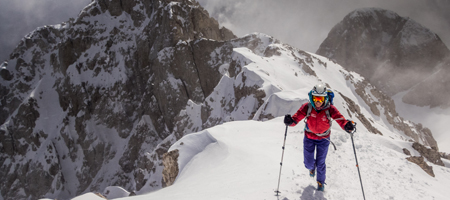The other week I was at the Major Project Association‘s 30th annual dinner in Claridges. I sat with some interesting people and learnt a fair amount about tunnel boring machines and banking, not a usual combination. However what really sparked me was the after dinner talk by Cathy O’Dowd. Cathy is a South African mountaineer. She’s an adventurer who has climbed Everest from both sides (before it became a tourist spot). She regularly looks for the edgiest climbs all over the world.
Cathy O’Dowd
Cathy talked about her experiences in attempting to climb the longest as yet unclimbed ridge in the Himalayas. Before the team she went with attempted it no-one had climbed the ridge and made the summit. It had an 18% death rate (that’s worse odds than Russian Roulette). Before the talk I was somewhat sceptical about the link with project management, although I thought it would be interesting. I’ve done low-level climbs in Scotland and even worked on the hill team of Lochgoilhead Scout Activity Centre following graduation from uni. It turned out though that Cathy’s climb was a lot like some of the major projects I’ve worked on, but with a lower chance of dying in the process…
Climbing as a Project
Cathy outlined the objective, to get to the summit by going along the ridge. They had constraints, they had to carry everything that they needed with them. There was no re-supply along the ridge, and the challenge only worked if they were self-sufficient. Careful thought on the make-up of the team went on, they had a mix of widely experienced climbers and also three sherpas with depth of experience in the Himalayas and the physical advantages of being adapted for high altitude living.
Once the team was assembled they spent time identifying risks and then the mitigations. They planned contingencies, looked at resources, minimising weight (cost) to ensure they could carry on for as long as possible. Finally they came up with a plan, they had ten days of food. They had escape routes if anything went wrong at various points along the ridge. The next stage was implementation.
Lessons
Some interesting observations from the guest speaker.
- Sherpas v European climbers and the strengths they each bring. Sherpas are great at altitude, and know a handful of mountains really well. The Adventurers have been on lots of different mountains across the planet, and have a more general overview. The key is better comms between both groups, don’t get sucked into chasing the sherpas and losing time for strategic planning. Especially when you aren’t on the familiar territory of the known knowns.
- Planning is what we fall back on, but it isn’t the truth. Of necessity plans are based on assumptions, these need tested against the ground truth we find when we get there. Need to take time to think and rest.
- We never overestimate logistics or admin requirements, and these are vital to success and our ability to extemporise in the face of difficulties or the unexpected.
- Risk is about managing the ways out, always have contingency plans.
- In planning we’re always wildly optimistic.. Maybe we should have a tag team planner that just puts in breathing space through the initial plan before we get it approved.

